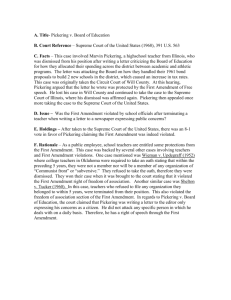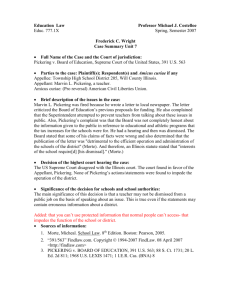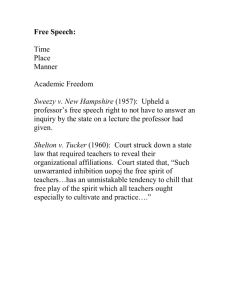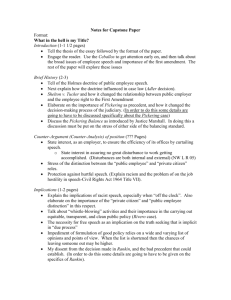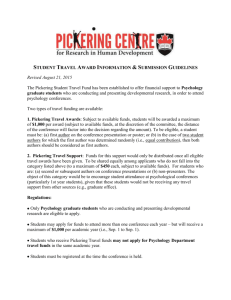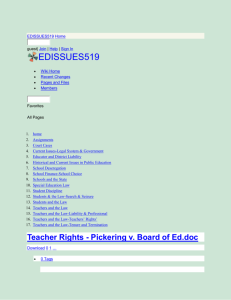Pickering v. Board of Education Case Brief | Free Speech
advertisement
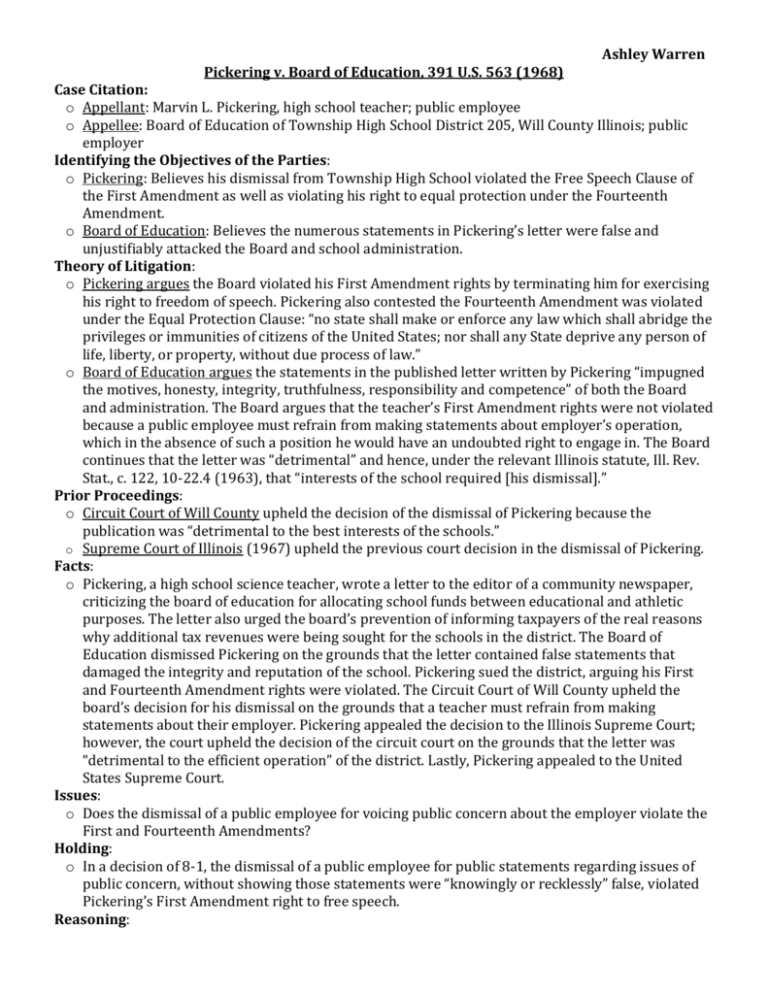
Ashley Warren Pickering v. Board of Education, 391 U.S. 563 (1968) Case Citation: o Appellant: Marvin L. Pickering, high school teacher; public employee o Appellee: Board of Education of Township High School District 205, Will County Illinois; public employer Identifying the Objectives of the Parties: o Pickering: Believes his dismissal from Township High School violated the Free Speech Clause of the First Amendment as well as violating his right to equal protection under the Fourteenth Amendment. o Board of Education: Believes the numerous statements in Pickering’s letter were false and unjustifiably attacked the Board and school administration. Theory of Litigation: o Pickering argues the Board violated his First Amendment rights by terminating him for exercising his right to freedom of speech. Pickering also contested the Fourteenth Amendment was violated under the Equal Protection Clause: “no state shall make or enforce any law which shall abridge the privileges or immunities of citizens of the United States; nor shall any State deprive any person of life, liberty, or property, without due process of law.” o Board of Education argues the statements in the published letter written by Pickering “impugned the motives, honesty, integrity, truthfulness, responsibility and competence” of both the Board and administration. The Board argues that the teacher’s First Amendment rights were not violated because a public employee must refrain from making statements about employer’s operation, which in the absence of such a position he would have an undoubted right to engage in. The Board continues that the letter was “detrimental” and hence, under the relevant Illinois statute, Ill. Rev. Stat., c. 122, 10-22.4 (1963), that “interests of the school required [his dismissal].” Prior Proceedings: o Circuit Court of Will County upheld the decision of the dismissal of Pickering because the publication was “detrimental to the best interests of the schools.” o Supreme Court of Illinois (1967) upheld the previous court decision in the dismissal of Pickering. Facts: o Pickering, a high school science teacher, wrote a letter to the editor of a community newspaper, criticizing the board of education for allocating school funds between educational and athletic purposes. The letter also urged the board’s prevention of informing taxpayers of the real reasons why additional tax revenues were being sought for the schools in the district. The Board of Education dismissed Pickering on the grounds that the letter contained false statements that damaged the integrity and reputation of the school. Pickering sued the district, arguing his First and Fourteenth Amendment rights were violated. The Circuit Court of Will County upheld the board’s decision for his dismissal on the grounds that a teacher must refrain from making statements about their employer. Pickering appealed the decision to the Illinois Supreme Court; however, the court upheld the decision of the circuit court on the grounds that the letter was “detrimental to the efficient operation” of the district. Lastly, Pickering appealed to the United States Supreme Court. Issues: o Does the dismissal of a public employee for voicing public concern about the employer violate the First and Fourteenth Amendments? Holding: o In a decision of 8-1, the dismissal of a public employee for public statements regarding issues of public concern, without showing those statements were “knowingly or recklessly” false, violated Pickering’s First Amendment right to free speech. Reasoning: o Teachers cannot constitutionally be compelled to relinquish their First Amendment rights on matters of public interest. Shelton v. Tucker, 364 U.S. 479 (1960); Keyishian v. Board of Regents, 385 U.S. 589 (1967). o The statements made in the letter are not directed towards any person with whom Pickering would be in contact with during his daily teaching duties. o No evidence was brought to support the allegations that the letter brought about controversy and/or conflict. o Much of the information discussed in the letter was public record, which did not qualify Pickering to speak with greater authority than any other taxpayer. o New York Times Co. v. Sullivan, 376 U.S. 254 (1964). o Garrison v. Louisiana, 379 U.S. 64 (1964). Disposition: o A teacher’s right to free speech to comment on public issues and policies is equal to that of a member of the general public; the prior decision of Pickering’s dismissal must be reversed. o ***Establishment of the Pickering Test began Illinois School Code: Sec. 10-22.4. Dismissal of teachers. To dismiss a teacher for incompetency, cruelty, negligence, immorality or other sufficient cause, to dismiss any teacher on the basis of performance and to dismiss any teacher whenever, in its opinion, he is not qualified to teach, or whenever, in its opinion, the interests of the schools require it, subject, however, to the provisions of Sections 24-10 to 24-16.5, inclusive. Temporary mental or physical incapacity to perform teaching duties, as found by a medical examination, is not a cause for dismissal. Marriage is not a cause of removal. (Source: P.A. 97-8, eff. 6-13-11.)
